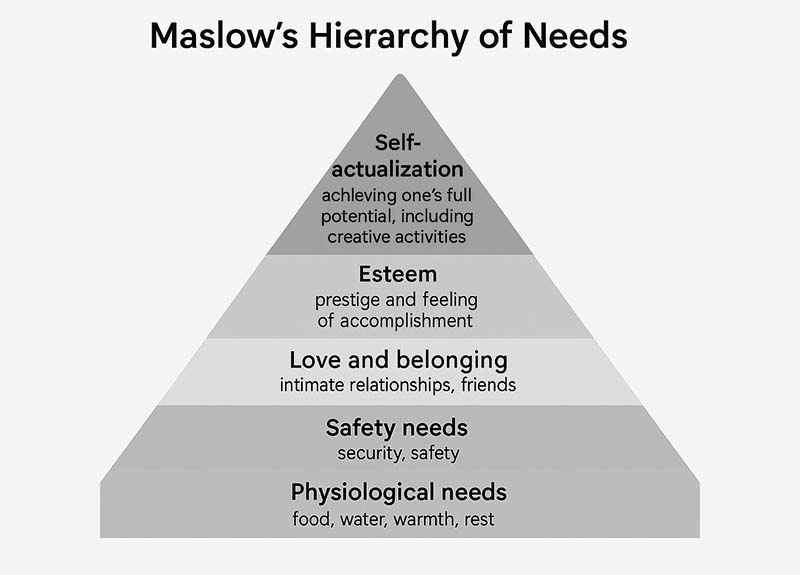Buying or renting a property — especially a residence — is not merely a financial transaction. It is a deep psychological experience, rooted in existential needs. To truly understand our relationship with the spaces we inhabit, we must examine some of the most important theories in psychology.
Abraham Maslow’s Hierarchy of Needs and Housing
Abraham Maslow (1943) introduced a hierarchical model of human needs, widely known as Maslow’s Hierarchy. According to this model, humans first satisfy basic needs before progressing to more complex ones — ultimately reaching self-actualization.
While the theory has received criticism for its limited empirical foundation, it remains a powerful framework for understanding human behavior, especially when it comes to choices related to housing.
Let’s see how each level relates to the need for — or ownership of — a home:
Physiological Needs → Home as Shelter
At the base of the pyramid lie the basic needs: food, water, sleep, and shelter. A home meets our need for rest and protection from the elements — cold, heat, noise.
Example: A student moving to a new city seeks a small studio near campus to sleep, eat, and feel safe.
Safety Needs → Ownership as Protection
A home offers stability and a sense of control. Home ownership is often associated with the desire to “not depend on others.”
Example: A young couple buys their first home to build a stable family environment and invest in their future.
Love and Belonging → Home as a Space of Connection
The neighborhood, relationships with neighbors, the ability to host friends — all shape our sense of belonging.
Example: A family chooses a home near schools, parks, and close friends because they want their children to grow up within a strong community.
Esteem Needs → Home as a Reflection of Personal Worth
A home often expresses social status or personal identity. Buying a “good” property can be a form of self-validation.
Example: A professional selects a loft overlooking the Acropolis — not just for the aesthetics, but to reflect their career success.
Self-Actualization → The Home as a Symbol of Freedom and Identity
At the top of the pyramid, the home becomes something more than just space — it becomes a dream fulfilled.
Example: An artist buys a small house on an island to create, write, and live closer to nature. They care less about resale value and more about inspiration.
Modern Psychological Theories That Also Explain Our Bond with “Home”
Self-Determination Theory (Deci & Ryan)
This theory highlights three core psychological needs:
- Autonomy – to make our own decisions
- Competence – to feel capable and effective
- Relatedness – to feel connected to others
- A home embodies all three: control, achievement, and belonging.
Attachment Theory (Bowlby / Ainsworth)
Our emotional attachment to physical space begins in early childhood. The family home gains a strong emotional value that is hard to let go.
Example: Many owners hesitate to sell their childhood home, even if it’s outdated or impractical — not because of its market value, but because it holds a piece of memory.
Philosophical Approach to Dwelling (Gaston Bachelard)
French philosopher Gaston Bachelard once wrote:
“The house is the lighthouse of our dreams.”
A home is not merely a structure. It is a space of imagination, memory, and emotional safety.
Example: The “first home” of a person is never forgotten — even if it was just a room with a shared bathroom.
Greece as a Cultural and Emotional Place to Call “Home”
Greece is not just a place to live — it is a cultural and emotional destination. The connection to nature, the abundance of light, the proximity to sea or mountains, the human-scale cities, and the social value of neighborhood life, make living in Greece much more than just “shelter.”
For Greeks, home is a symbol of independence, family continuity, and a point of return — a personal “harbor.”
For international buyers, it is often a transformational life decision, associated with a slower, more meaningful, and authentic way of being.
What does all this mean for the modern high-skilled realtor?
The job of a real estate agent is not just technical. It is deeply human and psychological.
By understanding where a client is within the “pyramid” or which emotional stage they’re in, we can:
– Communicate more effectively
– Recommend more suitable properties
– Build deeper trust
– Create long-term client relationships
Conclusion
A home is not just a property. It is a shelter, a mirror, a symbol, and a dream.
When we truly understand the person behind the client, we offer real solutions — not just square meters.
***
Copyright Notice
This article is protected by intellectual property law and may not be reproduced, modified, or commercially used without written permission. Sharing is allowed only with proper credit and a live link to the original publication. For licensing or reproduction requests, contact: info@mesitis.org
